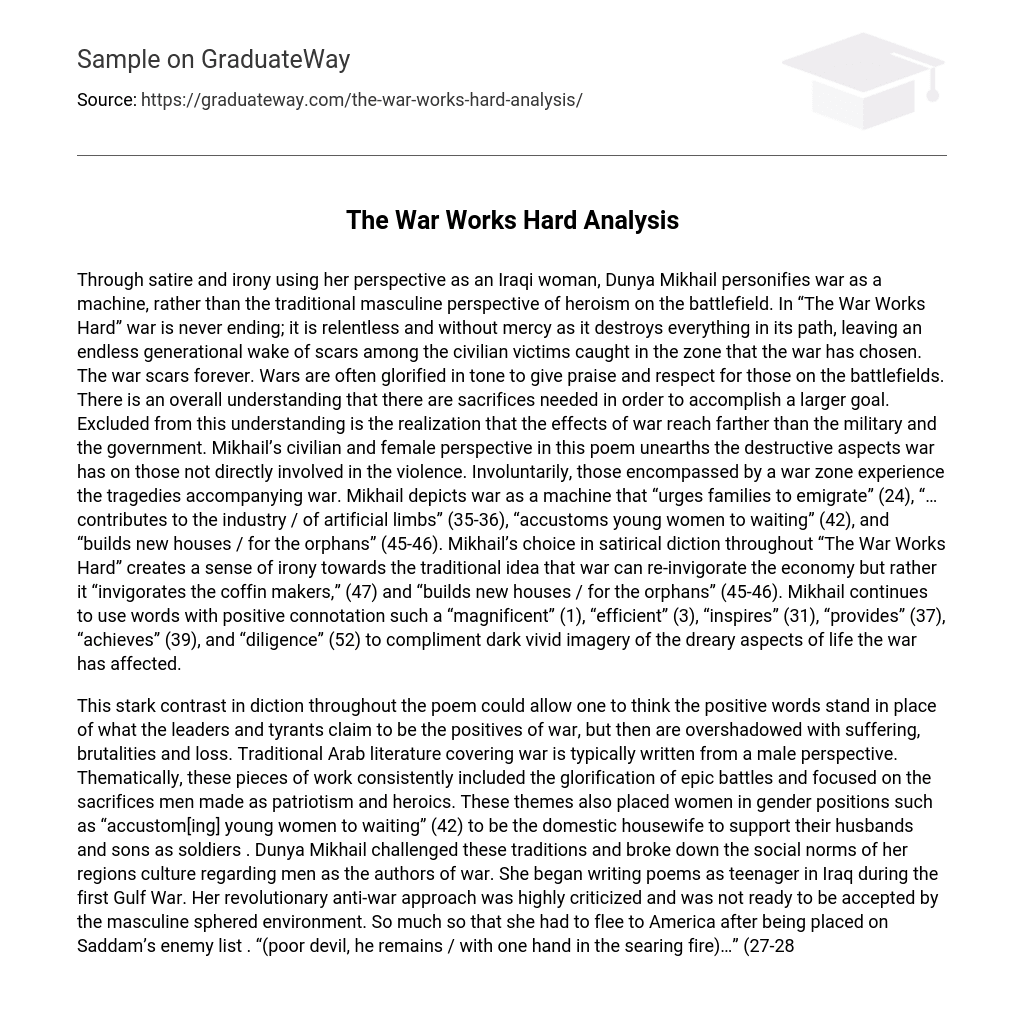Through satire and irony, using her perspective as an Iraqi woman, Dunya Mikhail personifies war as a machine, rather than the traditional masculine perspective of heroism on the battlefield. In “The War Works Hard,” war is never-ending; it is relentless and without mercy as it destroys everything in its path, leaving an endless generational wake of scars among the civilian victims caught in the zone that the war has chosen. The war scars forever. Wars are often glorified in tone to give praise and respect to those on the battlefields. There is an overall understanding that sacrifices are needed to accomplish a larger goal. Excluded from this understanding is the realization that the effects of war reach farther than the military and the government. Mikhail’s civilian and female perspective in this poem unearths the destructive aspects war has on those not directly involved in the violence. Involuntarily, those encompassed by a war zone experience the tragedies accompanying war. Mikhail depicts war as a machine that “urges families to emigrate” (24), “…contributes to the industry / of artificial limbs” (35-36), “accustoms young women to waiting” (42), and “builds new houses / for the orphans” (45-46). Mikhail’s choice in satirical diction throughout “The War Works Hard” creates a sense of irony towards the traditional idea that war can re-invigorate the economy but rather it “invigorates the coffin makers” (47) and “builds new houses / for the orphans” (45-46). Mikhail continues to use words with positive connotation such as “magnificent” (1), “efficient” (3), “inspires” (31), “provides” (37), “achieves” (39), and “diligence” (52) to compliment dark vivid imagery of the dreary aspects of life the war has affected.
This stark contrast in diction throughout the poem could allow one to think that the positive words stand in place of what the leaders and tyrants claim to be the positives of war, but are then overshadowed with suffering, brutalities, and loss. Traditional Arab literature covering war is typically written from a male perspective. Thematically, these pieces of work consistently include the glorification of epic battles and focus on the sacrifices men made as patriotism and heroics. These themes also place women in gender positions such as “accustom[ing] young women to waiting” (42) to be the domestic housewife to support their husbands and sons as soldiers. Dunya Mikhail challenged these traditions and broke down the social norms of her region’s culture regarding men as the authors of war. She began writing poems as a teenager in Iraq during the first Gulf War. Her revolutionary anti-war approach was highly criticized and was not ready to be accepted by the masculine sphere environment. So much so that she had to flee to America after being placed on Saddam’s enemy list. “(Poor devil, he remains / with one hand in the searing fire)…” (27-28) is a metaphor for the by-product of hate that war leaves after it has consumed and spat out the initial generation and is finished “summon[ing] rain / from the eyes of mothers” (10-11).
This, in turn, lubricates and fuels the machine to continue its efficient” (3) vicious cycle of an eye-for-an-eye “…with unparalleled diligence!” (51-52) so that it can “swing copes through the air” (8) tomorrow. Never pausing and becoming thoughtless, the routine of the war machine becomes muscle memory, and from muscle memory, it becomes tradition; until life without war is not understood. While interviewed on NPR, Dunya Mikhail discussed “The War Works Hard” and her views on war. She explains her belief that “the killed dies physically and the killer dies morally, so they are both dead”. This can be insightful when analyzing why the war “achieves equality between killer and killed” (39-40), leaving thought to the idea that it is no better to be living rather than dead if you cannot be morally alive. The poem continues with “some are lifeless and glistening, others are pale and still throbbing…” (15-16), suggesting possibly that the morally dead killers suffer through life, as the glowing dead are freed from their war machine tormentors.
Yet no one gives it a word of praise” (53-54) perfectly concludes the irony of war because we decorate our warriors and “award medals to generals” (33), while at the same time, the war “gives grave diggers a pat on the back” (48-49). “The War Works Hard” by Dunya Mikhail truly reinvents how war should be envisioned. It is not only the male patriot or hero that is left scarred from battle, but the society as a whole, consumed by the war machine, left in ruins. War’s destruction does not discriminate; from the child to the mother, the clergy to the grave diggers, everything and everyone will suffer, mourn, and be forever changed. Mikhail doesn’t write her poems to heal the wounds; rather, she believes her poems are like “x-rays, allowing you to see the wound and understand it.” Hopefully, through her work, we can understand how to make the relentless war machine stop and begin the healing process for her people.





